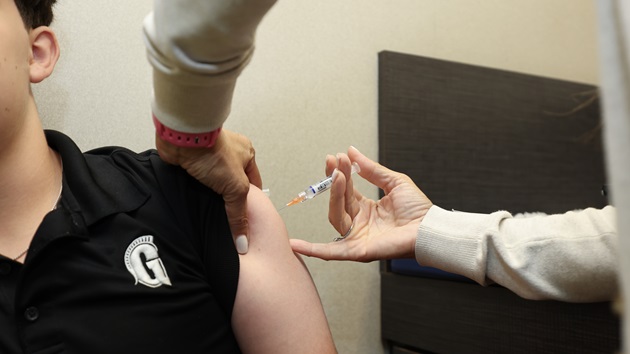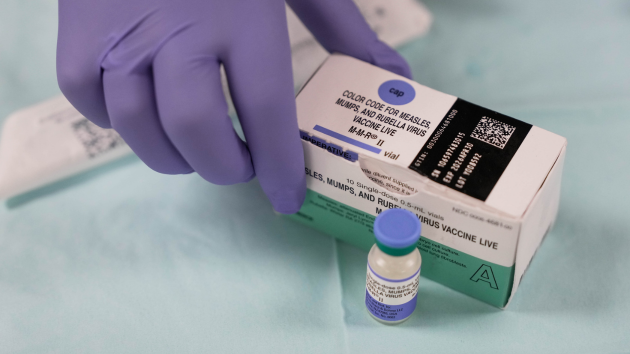Florida doctor speaks on latest six-week abortion ban in the state
Written by ABC Audio ALL RIGHTS RESERVED on May 2, 2024

(NEW YORK) — As Florida’s six-week abortion ban took effect Wednesday, Dr. Robyn Schickler, CMO of Planned Parenthood of Southwest and Central Florida, discussed counseling patients who may be seeking abortions beyond six weeks of pregnancy.
Schickler recently had to inform her patients that Florida does not offer abortion services, and had to refer them to nearby states that do. She explains that it is a difficult conversation to have.
ABC News Live sat down with Schickler as she discussed the latest abortion ban in Florida.
ABC NEWS LIVE: For more about the latest abortion ban in Florida, we want to bring in Chief Medical Officer Dr. Robyn Schickler from Planned Parenthood of Southwest and Central Florida. Doctor, thank you so much for joining us. What are your conversations like with patients who arrive at Planned Parenthood for an abortion and are more than six weeks pregnant?
SCHICKLER: Yeah. So that’s a very hard conversation. And, you know, we actually did have to start having those before today because Florida does have a 24-hour waiting period. So there were patients that we saw yesterday and even the day before, that we wouldn’t be able to get in before May 1. It’s, it’s a hard conversation. We tell them that we would not be able to provide the abortion to them in the state of Florida, and we provide them their options. And if they want to continue seeking an abortion, then we have patient navigators that can help them get to where they need to go, and get the resources to get to where they need to go.
ABC NEWS LIVE: And so when you say you provide them options, does that mean you give them recommendations outside of the state?
SCHICKLER: Yes. So, we give them recommendations for different clinics that are outside the state. And if they need something, like navigation services from us, we can provide that.
ABC NEWS LIVE: And I want to back up for a little bit because we’ve heard a lot of conversations about many women not even knowing that they’re pregnant at six weeks. Is that something that you run into as well?
SCHICKLER: Yes. So the way we date a pregnancy is we count from the first day of the last menstrual period. That’s also basically what ultrasounds go on. So if someone has a regular period, by the time they’ve missed a period, they’re already four weeks along. And so that gives them little time to, to one, even just realize that they missed a period. And two, to obtain the care that they need. So six weeks is really a tiny amount of time. And the majority of patients that I’ve seen in my practice don’t even know till they’re at least six weeks.
ABC NEWS LIVE: And what are you hearing from these patients right now, especially in regards to having to seek health care out of the state of Florida?
SCHICKLER: These patients are frustrated. You know, and it’s a mixture. Some patients are aware of what’s going on. Some people, you know, are busy in their lives and and don’t have the time to keep track of everything going on. And so it’s the first time they’ve heard about it, when we say we can’t take care of them. They’re frustrated. They’re mad. They they just came in to get health care, and now they’re being told that they can’t, and that they have to travel hundreds if not thousands of miles out of the state of Florida from their home to get that care.
ABC NEWS LIVE: And with the six-week ban now taking effect, what concerns you most with regard to a pregnant person’s physical and emotional health?
SCHICKLER: Yeah, I think, you know, people are going to continue pregnancies that put them at high risk of both physical and mental and emotional harm and anguish and distress. And I think we’re going to see an increase in things like maternal morbidity or sick women who are pregnant because we can’t intervene before any of that happens.
ABC NEWS LIVE: Can you tell us about what’s next? Because there’s a lot that that still isn’t known, as you said, even for somebody to define what constitutes putting the mother’s life at risk. And I know that there’s an amendment on the ballot for the November election to limit the government’s power. Tell us what that amendment seeks to do.
SCHICKLER: Yeah. So this amendment is really to get our rights back. It’s to a to be able to seek medical care and obtain that medical care without the government intervening in that care. And we deserve that right, our patients deserve that right — to seek whatever medical care they need. And abortion happens to be part of that medical care for many people.
ABC NEWS LIVE: Dr. Robin Schickler, we thank you so much for your time and insight. Really appreciate it.
SCHICKLER: Thank you.
Copyright © 2024, ABC Audio. All rights reserved.
 KVSP
KVSP 




